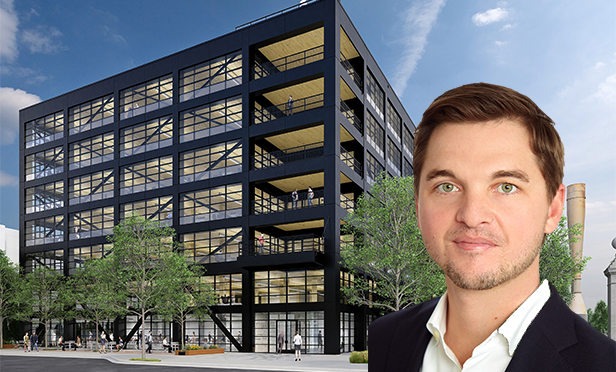
ATLANTA, GA—With ground broken this month on the 230,000-square-foot T3 West Midtown office development within Atlantic Station, Hines and its partner Invesco Real Estate are acknowledging the rising importance of technology infrastructure in making office space attractive to contemporary tenants.
The project will provide first-rate connectivity for tenants, and has been named the first Wired Certified Platinum New Development in Atlanta.
“What we're seeing in Atlanta is a perfect ecosystem of landlords who are sophisticated and knowledgeable enough to understand that this is important to tenants,” says JD Jeske, the head of WiredScore's Atlanta office. Jeske says the brokerage community and its tenants “are asking very sophisticated questions and trying to locate their business that meets the needs of connectivity and technology of today, and also where they can grow their business for the next 10 years.”
T3 West Midtown is designed by Hartshorne Plunkard Architecture, in conjunction with the DLR Group. In this innovative, seven-story mass timber office building, work spaces will be designed for optimal collaboration and common social areas will foster a greater sense of camaraderie and community.
“T3 Hines for us is a Platinum project and it can be absolutely beautiful,” Jeske says. “The interesting thing there is that 'timber, transportation, and technology'—what T3 stands for—means that they're building a building that looks old. But it is the best connected building at a platinum level.”
T3 West Midtown will also include a fully modern fitness center, conference center, tenant balconies, and a gorgeous rooftop deck.
“We are excited to kick off construction of this differentiated product that provides unique architecture with a balance of amenities and services connecting them to the 24-hour attributes of Atlanta's urban core,” says Hines senior managing director John Heagy.
Paying attention to the technology infrastructure will attract companies that need reliable telecommunications and data distribution, says Jeske.
“As Atlanta positions itself to be kind of the tech mecca of the southeast, we at WiredScore are taking telecom and connectivity, which can sometimes be a pain point, and something that's pretty complex to digest and understand, and allowing transparency into that and helping them find the best connected building in the market,” says Jeske.
It's not just the brand-new properties that are focusing on technology infrastructure, says Jeske. Older buildings are being renovated and retrofitted with advanced technologies to accommodate demands for untethered workspace, he says.
Jamestown's Ponce City Market and North American Properties' Colony Square “are two of our platinum buildings that are older buildings that have been incredibly well retrofitted and are a perfect example of doing that well,” he says. “Platinum is our highest level and the date or vintage of a building does not accurately reflect how well or how poorly a building is connected.”
Increasingly, companies expect office space to enable uninterrupted use of cell phones by employees “from the parking lot to your office,” Jeske says. “It's just become non-negotiable and not acceptable anymore to have any kind of downtime,” he says. “We rely on connectivity through and through.”
Ironically, the rise of LEED certified buildings and low-E glass, technologies to make buildings more sustainable, are interfering with cell reception, a problem that may get even worse as 5G data and phone networks become the new standard, Jeske says.
“Workspace design is going to need to address non-cell coverage,” he says.
The untethered office experience will be essential to keeping millennial workers happy, Jeske notes. As millennials come to dominate the workforce by 2025, with more than 70 percent of the active workers, they will expect the experience to be seamless, he says.
“If they are not happy with their work environment and what they're doing, they're happy to move on to another job that's providing in that space,” he says.
CORRECTION, 5/29/2018, 1:40 p.m.: Because of editing errors, two quotes were incorrectly rendered in an earlier version of this story. T3 stands for “timber, transportation, and technology,” not “technologies.” J.D. Jeske also said that two properties, Ponce City Market and Colony Square, are “a perfect example of doing that well,” not “doing that walk.”
© Touchpoint Markets, All Rights Reserved. Request academic re-use from www.copyright.com. All other uses, submit a request to [email protected]. For more inforrmation visit Asset & Logo Licensing.







